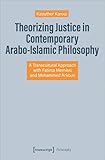Theorizing Justice in Contemporary Arabo-Islamic Philosophy : A Transcultural Approach with Fatima Mernissi and Mohammed Arkoun / Kaouther Karoui.
Material type: TextSeries: Edition Moderne PostmodernePublisher: Bielefeld : transcript Verlag, [2023]Copyright date: ©2023Description: 1 online resource (294 p.)Content type:
TextSeries: Edition Moderne PostmodernePublisher: Bielefeld : transcript Verlag, [2023]Copyright date: ©2023Description: 1 online resource (294 p.)Content type: - 9783839465516
- Islamic philosophy
- Justice (Philosophy)
- Culture
- French History of Philosophy
- Intercultural Philosophy
- Islamic Feminism
- Law
- Philosophy
- Postcolonial Theory
- Postcolonialism
- Social Philosophy
- Theories of Justice
- Transcultural Philosophy
- PHILOSOPHY / Social
- Culture
- French History of Philosophy
- Intercultural Philosophy
- Islamic Feminism
- Law
- Philosophy
- Postcolonial Theory
- Postcolonialism
- Social Philosophy
- Theories of Justice
- Transcultural Philosophy
- 181 23/eng/20231221
- B5295 .K37 2024
- online - DeGruyter
| Item type | Current library | Call number | URL | Status | Notes | Barcode | |
|---|---|---|---|---|---|---|---|
 eBook
eBook
|
Biblioteca "Angelicum" Pont. Univ. S.Tommaso d'Aquino Nuvola online | online - DeGruyter (Browse shelf(Opens below)) | Online access | Not for loan (Accesso limitato) | Accesso per gli utenti autorizzati / Access for authorized users | (dgr)9783839465516 |
Frontmatter -- Contents -- Acknowledgements -- 1. Introduction -- Introduction -- 1.1 The concept of justice in Arabo-Islamic and Western philosophy -- 1.2 The significance of postcolonial theory for the Maghrebian context -- 2. Background and methods in the thought of Fatima Mernissi -- Introduction -- 2.1 The concept of secular humanism: The necessity of emancipating Islamic thought from religious and nationalist conceptions -- 2.2 The concept of justice in the modern era: The entanglement of descriptive and normative claims of justice theories -- 2.3 The rereading of ninth-century early Arabo-Islamic thought: The theorization of notions of justice through Mernissi’s transcultural and humanistic approaches -- 2.4 Transdisciplinary approaches to establish gender justice within the framework of Islamic feminism -- 2.5 The relevance of Mernissi’s feminist thought for a transcultural approach to feminism -- 2.6 Conclusion on the thought of Fatima Mernissi -- 3. Background and methods in the thought of Mohammed Arkoun -- Introduction -- 3.1 Mohammed Arkoun’s rereading of the Islamic thought of Miskawayh (d. 1030): A multifaceted concept of justice -- 3.2 The method of applied Islamology: A transcultural and transdisciplinary key for the renewal of Islamic studies -- 3.3 Toward an emancipation from hegemonic constructions: The critique of orthodoxy, Arab nationalism, and Euro-modernism -- 3.4 The concept of emerging reason: A key for a democratic and cosmopolitan project -- 3.5 Conclusion on the thought of Mohammed Arkoun -- 4. Epilogue: Theorizing justice in contemporary Arabo-Islamic philosophy -- Introduction -- 4.1 The common approach to theorizing justice by Fatima Mernissi and Mohammed Arkoun -- 4.2 On the relevance of a cosmopolitan theory of justice based on a transcultural approach -- Bibliography
restricted access online access with authorization star
http://purl.org/coar/access_right/c_16ec
What is »justice« from the perspective of contemporary Arabo-Islamic philosophy? Kaouther Karoui takes a transcultural approach, open to different philosophical traditions, and seeks to decenter Western notions of normativity. She focuses on two thinkers, namely the feminist Fatima Mernissi (d.2015) and Mohammed Arkoun (d.2010), a well-known critic of hegemony and orthodoxy. She situates their thinking within current debates among Arab thinkers and brings their ideas into dialog with Western political philosophy. This study thus challenges stereotypes about the Arab-Islamic world by discussing postcolonial theories of gender justice, political freedom, and religion.
Mode of access: Internet via World Wide Web.
In English.
Description based on online resource; title from PDF title page (publisher's Web site, viewed 06. Mrz 2024)


